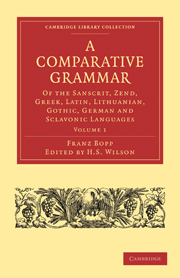FORMATION OF CASES
Published online by Cambridge University Press: 04 April 2011
Summary
112. The Indian Grammarians take up the declinable word in its primary form, i.e. in its state when destitute of all case-termination; and this bare form of the word is given also in dictionaries. In this we follow their example; and where we give Sanscrit and Zend nouns, they stand, unless it is otherwise specified, or the sign of case is separated from the base, in their primary form. The Indian Grammarians, however, did not arrive at their primary forms by the method of independent analysis, as it were by an anatomical dissection or chemical decomposition of the body of language; but were guided by the practical use of the language itself, which, at the beginning of compounds—and the art of composition is, in Sanscrit, just as necessary as that of conjugation or declension— requires the pure primary form; naturally with reservation of the slight changes of the adjoining limits of sound, rendered necessary at times by the laws of euphony. As the primary form at the beginning of compounds can represent every relation of case, it is, as it were, the case general, or the most general of cases, which, in the unlimited use of compounds, occurs more frequently than any other.
- Type
- Chapter
- Information
- A Comparative Grammar of the Sanscrit, Zend, Greek, Latin, Lithuanian, Gothic, German, and Sclavonic Languages , pp. 124 - 349Publisher: Cambridge University PressPrint publication year: 2010First published in: 1843



